Definition: Corporate culture is the blend of sociability and solidarity in an organization. It can be understood as the ethics, values, perception, atmosphere, practices, attitudes and beliefs shared by the employees of a company to achieve organizational goals and objectives.
For Example; Let us take the instance of a world-renowned Swedish based furniture brand ‘Ikea’. The company’s positive culture has contributed to its success massively.
The employees themselves appreciate the company’s efforts to improve its culture continuously.
The company follows a culture of process simplicity, togetherness and teamwork.
Moreover, ‘Ikea’ values its employees as human beings and not just as resources, also they have freedom of speech and the right to express their feelings.
Content: Corporate Culture
Characteristics of an Effective Corporate Culture
Just like a family has some values and rituals which directs the family members, a company also has business ethics and practices which guides its employees.
To know more about the corporate culture, we must go through its following features: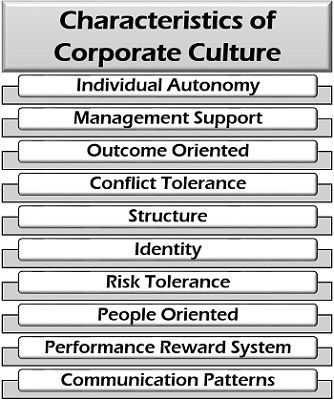
Individual Autonomy: An influential corporate culture emphasizes on developing employee’s freedom of speech, high level of responsibility and ability to take initiatives.
Management Support: In a positive work culture, the managers are more friendly and co-operative and provides full assistance to the subordinates and guide them to achieve their goals.
Outcome-Oriented: The whole organization, including the employees and the management, becomes goal-oriented and focuses on deriving the required results.
Conflict Tolerance: There is an open communication system in such organizations where employees are free to discuss criticisms and conflicts in a stable work environment to resolve the specified problems.
Structure: The organizational structure refers to the company’s centralization or decentralization level. A company with a good work culture well defines the degree of control and supervision, along with specifying the organizational goals and expectations.
Identity: The level to which the employees relate themselves to the organization, instead of working for a particular group or team or person.
Risk Tolerance: The company’s culture determines the degree of patience required by the employees to handle the stress in the work environment.
People Oriented: The extent to which the top-level managerial decisions affect the people working for the organization sets their values, norms, opinions and beliefs for or against the company.
Performance Reward System: Another thing that impacts the corporate culture is the reward system of the organization, such as performance-based appraisal or favouritism and hierarchy based promotion.
Communication Patterns: The communication system followed in the organization, i.e. whether there is liberty of exchanging information informally or communicating through a formal hierarchical structure.
Elements of Corporate Culture
What all components come under corporate culture? Or What does corporate culture comprise?
To answer the above questions, let us know about each element of the corporate culture in detail below: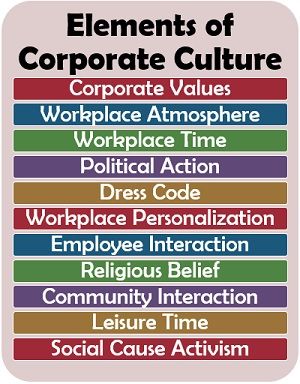
Corporate Values
The values of an organization comprised of the code of conduct and expected the behaviour of the staff, which when implemented, guides the day to day business operations and helps in better decision making and communication.
Workplace Atmosphere
The work environment in the company should be positive, encouraging and enthusiastic for creating a motivated and happy workforce.
Workplace Time
The work timings and duration of the company is a part of its culture. If the schedules are convenient, and the work duration is according to the universal standards, employee retention can be attained.
Political Action
The political favouritism may sometime create a significant impact over the corporate culture of the large organizations since they operate across the country or the globe. However, small organizations serving in a particular locality are not much affected by such factors.
Dress Code
The employee’s dress code, whether formal or informal, is a part of the organization’s culture. Usually, a traditional organization has a uniform, to promote discipline and uniformity.
Whereas, organizations with a new perception allow a casual dress code to ensure employee’s comfort and enhance their creativity and productivity.
Workplace Personalization
There is liberty in some organizations to keep the snapshots or collectables of the family members to add a personalized touch to the workplace, making the employees feel at home.
Employee Interaction
The companies where there is cut-throat competition among the employees lack a friendly interactive environment. Other organizations which demand teamwork and coordination between the workers, encourage more communication.
Religious Belief
In a large organization, there are many employees, and everyone has their own religious beliefs which may be deprived while determining the corporate culture. Whereas in small business units, these ethical values may be considered as of high importance.
Community Interaction
The organization also has some responsibility towards the local community in which it operates. This is a part of its corporate culture. It resembles how the company interacts with the community as a whole.
Leisure Time
The employees’ manner of spending the non-working hours, such as on weekends or holidays reflect the company’s culture. If free time is spent with colleagues cum friends, the organization has more of a camaraderie environment.
Social Cause Activism
For some companies, profit is not everything. They look forward to achieving contentment by contributing something to society.
Therefore, these organizations hold a culture promoting charity, donation and endowment for the various social causes like education, child labour, women empowerment, etc.
Types of Corporate Culture
The company’s culture is categorized under four different heads, based on two factors, i.e., sociability and solidarity.
The level to which the organization values its people or the tasks determines the following types of corporate culture: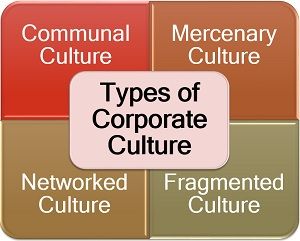
- Communal Culture: A work culture where sociability (people) and solidarity (task) are given equal importance; where trust, commitment and respect are the key factors; is a communal corporate culture.
- Mercenary Culture: The culture in which organizational goal and task are given the utmost importance and solidarity comes first, is called as a mercenary culture. The employees working in such organizations may experience stress, dissatisfaction or frustration on work.
- Networked Culture: This type of culture is highly people-oriented, and the employees are free to share their opinions and information. However, solidarity is ignored in these organizations, which may lead to unsatisfactory performance.
- Fragmented Culture: In fragmented culture, neither sociability nor solidarity is given any importance. In organizations with such perception, there is no work quality and task obligation. Also, the employees lack co-operation among themselves.
Importance of Corporate Culture
An influential corporate culture resembles excellent management, an efficient workforce and a healthy work environment in the organization.
The following are some of the benefits of developing a positive and productive corporate culture: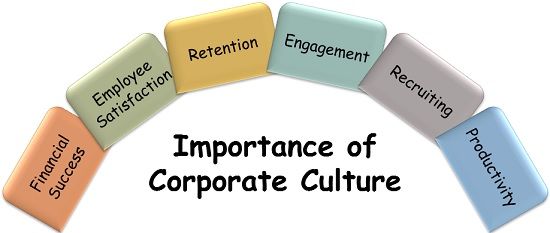
- Financial Success: When there is a pleasant corporate culture, the workforce performs enthusiastically. Employees put in extra efforts to increase sales, maximize profit, reduce cost and streamline the operations to achieve financial success.
- Employee Satisfaction: Employees feel safe and that they are heard and valued by the organization when there exists a robust corporate culture.
- Retention: A satisfied employee develops a commitment to his/her work and the organization. Moreover, the person looks for a long-term association with the company, which ultimately reduces the employees turnover percentage.
- Engagement: Employees’ engagement towards their duties and the organization is the result of an efficient corporate culture. Also, the staff seems to be highly committed and motivated to give their best for achieving the company’s goals.
- Recruiting: Job seekers today, want to work for the companies which have an impressive culture and consider the employees as a valuable asset for the organization. Therefore, a positive work culture helps the company to acquire resourceful talent and eases out the recruiting process.
- Productivity: Corporate culture enhances the performance of the employees, along with developing a progressive work environment to increase the overall productivity of the organization.
Addressing the Challenges Faced
When we talk about corporate culture, it is not something which can be implemented immediately in the organization. Instead, it is the values and ethics incorporated by the business over many years of successful operations.
The company faces multiple challenges while building an influential corporate culture. To resolve these problems, let us read further: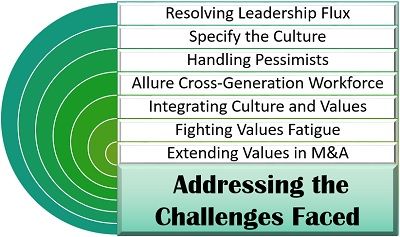
Resolving Leadership Flux
Many times in the urge of establishing an influential corporate culture, the top-level management faces issues related to turnover of the senior managers and even the CEOs.
Specify the Culture
The management perceives the company’s culture in its way. However, the employees have a different perspective on it. Thus, it becomes difficult to define corporate culture clearly.
Handling Pessimists
If the organization has some pessimist employees who always think of adverse outcomes, it becomes challenging to create a positive work culture.
Allure Cross-Generation Workforce
The corporate culture is expected to develop a multi-generation approach where consistent values are maintained to suit the perception of every age group, which is indeed a challenging task.
Integrating Culture and Values
In a multinational company, the senior management establishes values at the headquarters or head offices.
Thus, it becomes quite tricky for a diversified company to keep its culture and values united and to communicate the same throughout its multiple branches.
Fighting Values Fatigue
The company faces difficulty in spreading the company’s culture and beliefs. Values which are emphasized only by releasing a subtle message, again and again, becomes monotonous.
Therefore, to develop an employee’s interest in knowing and adopting the corporate culture, it must be depicted through different communication channels, pictures, stories, content, formats, etc.
Extending Values in Mergers and Acquisitions
When a company absorbs or acquires another business entity, a new workforce with two different cultures is formed. It is a tough task to integrate and reinforce the required ethics and values in the modern business unit for its successful operation.
Conclusion
The companies which maintain a world-class corporate culture are some of the market leaders and hold a high reputation among the job seekers.
Since the people’s mindset is working with those organizations which value the employees and their contribution towards business success.
Leave a Reply